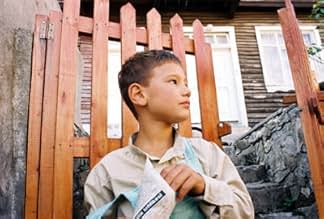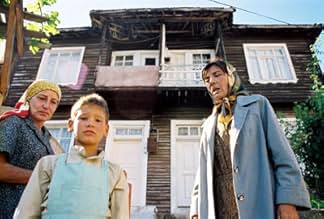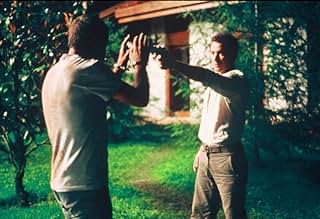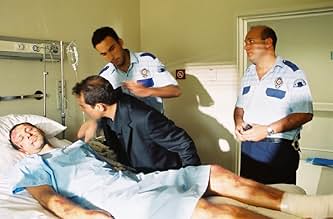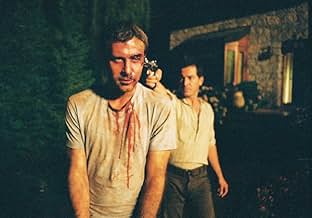A Turkish thriller about a man forced to confront his past after he loses everything in an accident.A Turkish thriller about a man forced to confront his past after he loses everything in an accident.A Turkish thriller about a man forced to confront his past after he loses everything in an accident.
- Awards
- 5 wins & 8 nominations total
Arda Seçgün
- Kerem
- (as Arda Secgun)
- Director
- Writer
- All cast & crew
- Production, box office & more at IMDbPro
Featured reviews
as seen in the name "everything about mustafa" the movie points out different flashbacks to describe the character. you can't make anything out of it unless you try to think everything separately + combining them + understand the whole idea. the best Turkish movie ever and definitely deserved the Oscar for the best foreign movie ( actually i found it to be better than most Oscar nominees )
with more thought and good dialogues added to Turkish movies like "anlat istanbul" and "mustafa hakkinda hersey", already developed Spanish movie sector and developing Turkish movie sector will have a very important affect on European movies.
with more thought and good dialogues added to Turkish movies like "anlat istanbul" and "mustafa hakkinda hersey", already developed Spanish movie sector and developing Turkish movie sector will have a very important affect on European movies.
With the potential of many alternative endings, "Mustafa Hakkinda Hersey" is a very successful movie. It is about some two or three days of a man who lost his wife in a surprising manner, and a lot more. The translation of the title is "Everything about Mustafa" since it covers his all life with minor flashbacks. The cinematography, the scenario, the rhythm and the actors are superb. I would be sorry if the movie is kept in the domestic market and not distributed to western audiences as well. Since I watched it on DVD, which is also well prepared in picture & sound quality, I'd advise all to find and watch it. The soundtrack made by "Mor ve Otesi" is also a good choice and goes parallel with the scenario. Mustafa ( Fikret Kushan ) presents an unexpected character with all details. Overall, for me an 8.5 rating won't be generous too.
Cagan Irmak's second feature-length movie "Mustafa Hakkinda Her Sey" is my favourite from his self-written and self-directed filmography. It's a Crime/Psycho, one of the few samples of this genre. The other most known Crime/Psycho movies are "Taxi Driver(1976)" ,"Natural Born Killers(1994)" ,"American Psycho(2000)" and so on. Each of those films have their own distinguishing features and Mustafa Hakkinda Her Sey has references with them. Cagan Irmak has successfully blended these features into his storyboard.
Starting with the opening scene, where Mustafa appears alone in his car at a night time running amok, we're receiving a conceptual warning to watch him very carefully within an Expressionist cinema language. In order to explain the reasons of his depression accordingly the story takes us to a warm family bliss evening, in which Mustafa is the father. We stay there with the family whole evening, witnessing to an ordinary family portrait but to rich character introductions. The next morning while Mustafa is at work, his only son in school, his wife has a deadly road accident. So the plot begins to develop very quickly. Mustafa runs to the hospital to get two shocking news one after another leading him into a manic depressive psychosis. He begins to rake up his past thinking his wife cheated on him, then his childhood traumas floods back. After his wife's funeral, he kidnaps her date when he's discharged from hospital.
The two leading actors Fikret Kuskan and Nejat Isler, performed their roles very well; especially at the scenes where they acted together. A little issue with Irmak's directing that supporting actors and even walker-ons couldn't square with the depressive mood of the movie. Nejat Isler plays a taxi driver, cross-referencing Robert De Niro in Scorsese's Taxi Driver(1976) with similarities to Travis Bickle character in his world-view and behavior patterns. Fikret Kuskan's character Mustafa portrays Patrick Bateman from American Psycho(2000) way too much better than Christian Bale did. I've read some audience reviews where people think that Mustafa character is unreal. I strongly advise them to search for "American Psycho" and Bret Easton Ellis to realize how ordinary people become psychopathic criminals. Additionally in subplots, the torture scenes were Tarantino style and they resemble Natural Born Killers a lot.
Technical aspects of this film is below average. Irmak is good at catching the best camera angles. Sounds and visuals are good enough to keep the tension through the whole movie. Mor ve Otesi did a noteworthy job in score and soundtracks.
With this film, Irmak presents an important message for whoever has past regrets in painful memories. At the end, his note showed that he dedicates this film in the memory of his father. In the leading role Mustafa experienced that he has done some faults which were at the point of no return. Regrets can kill, they slowly eat away the soul of someone who has done something wrong and they lead eventually to self-destruction. Mustafa refused to die like that. He had irreparable faults in his past. Soon he found out that the past is the way you want to remember it.
Starting with the opening scene, where Mustafa appears alone in his car at a night time running amok, we're receiving a conceptual warning to watch him very carefully within an Expressionist cinema language. In order to explain the reasons of his depression accordingly the story takes us to a warm family bliss evening, in which Mustafa is the father. We stay there with the family whole evening, witnessing to an ordinary family portrait but to rich character introductions. The next morning while Mustafa is at work, his only son in school, his wife has a deadly road accident. So the plot begins to develop very quickly. Mustafa runs to the hospital to get two shocking news one after another leading him into a manic depressive psychosis. He begins to rake up his past thinking his wife cheated on him, then his childhood traumas floods back. After his wife's funeral, he kidnaps her date when he's discharged from hospital.
The two leading actors Fikret Kuskan and Nejat Isler, performed their roles very well; especially at the scenes where they acted together. A little issue with Irmak's directing that supporting actors and even walker-ons couldn't square with the depressive mood of the movie. Nejat Isler plays a taxi driver, cross-referencing Robert De Niro in Scorsese's Taxi Driver(1976) with similarities to Travis Bickle character in his world-view and behavior patterns. Fikret Kuskan's character Mustafa portrays Patrick Bateman from American Psycho(2000) way too much better than Christian Bale did. I've read some audience reviews where people think that Mustafa character is unreal. I strongly advise them to search for "American Psycho" and Bret Easton Ellis to realize how ordinary people become psychopathic criminals. Additionally in subplots, the torture scenes were Tarantino style and they resemble Natural Born Killers a lot.
Technical aspects of this film is below average. Irmak is good at catching the best camera angles. Sounds and visuals are good enough to keep the tension through the whole movie. Mor ve Otesi did a noteworthy job in score and soundtracks.
With this film, Irmak presents an important message for whoever has past regrets in painful memories. At the end, his note showed that he dedicates this film in the memory of his father. In the leading role Mustafa experienced that he has done some faults which were at the point of no return. Regrets can kill, they slowly eat away the soul of someone who has done something wrong and they lead eventually to self-destruction. Mustafa refused to die like that. He had irreparable faults in his past. Soon he found out that the past is the way you want to remember it.
No doubt the lead characters has given some really good performance and somehow decent quality production for Turkish cinema. the plot is not that new , there are such same movies like same plot where wife died and husband found out that she was unfaithful (red shoe diaries by zalman king).
the movie has some huge flaw in start , the reason behind why wife goes unfaithful ? because husband is busy or very uptight ? and when the story starts about the wife when she sitting n crying in Cab , then later there is no such thing that why she was crying that moment.
the movie also some side story line of husband too but it doesnt connect to the main plot but it does connect to the ending which make it not satisfying or good ending.
the movie has some huge flaw in start , the reason behind why wife goes unfaithful ? because husband is busy or very uptight ? and when the story starts about the wife when she sitting n crying in Cab , then later there is no such thing that why she was crying that moment.
the movie also some side story line of husband too but it doesnt connect to the main plot but it does connect to the ending which make it not satisfying or good ending.
Sometimes it's wise to set aside one's prejudices against a film and consider it on its own merits as a contribution to the knowledge of the society that produces it.
Such is the case with MUSTAFA HAKKINDA HERŞEY (ALL ABOUT MUSTAFA). A Gothic melodrama reveling in its extremities, Çağan Irmak's film in my opinion piles absurdity on absurdity culminating in a sentimental denouement. But perhaps I am looking at it through jaundiced eyes.
The plot is straightforward: Mustafa (Fikret Kuşkan) is a successful businessman with a wife (Başak Köklükkaya) and son (Arda Seçgün) who runs his own film and advertising business. Life seems fairly good to him, although he does seem a little extreme in his reactions, especially during meetings. His wife Ceren dies unexpectedly in a car accident, that sends Mustafa into paroxysms of grief. Later on he discovers that she had had an affair with taxi-driver Fikret (Nejat İsler), so Mustafa determines to wreak revenge by imprisoning Fikret in a lonely house and forcibly extracting the truth from him. As time passes, we learn that Mostafa has had a highly troubled childhood, which explains why he reacts so excessively to the news of his wife's death.
The film is full of lurid sequences using tilted cameras and vivid colors to denote Mustafa's tortured state of mind. While alone with Fikret, he subjects the unfortunate taxi-driver to extreme forms of punishment, often involving S&M, which makes us feel that there is a sexual dimension to his sadism. The film includes tropes familiar from other Çağan Irmak films - the isolated house recalls KAÇAN FIRSATLAR LİMİTED; the sculptures adumbrate TAMAM MİYİZ?, and the sadism recalls KARANLIK TAKİLER. Throughout we are led to believe that Mustafa's behavior can be attributed to his childhood, especially his relationship to his father (who was equally sadistic).
At the same time he is portrayed as a family man with a touching concern for Kerem. This suggests some kind of cathartic desire; once he has exorcised the devil of childhood from his consciousness, he can be somehow released from mental torment. The diabolic aspects of the film are well brought out through the use of fast cutting.
The film does not tell us much about contemporary Turkish society; rather it suggests that human beings have to find their own means of coping with existence. Sometimes they cannot do this, and hence descend into abnormality.
Such is the case with MUSTAFA HAKKINDA HERŞEY (ALL ABOUT MUSTAFA). A Gothic melodrama reveling in its extremities, Çağan Irmak's film in my opinion piles absurdity on absurdity culminating in a sentimental denouement. But perhaps I am looking at it through jaundiced eyes.
The plot is straightforward: Mustafa (Fikret Kuşkan) is a successful businessman with a wife (Başak Köklükkaya) and son (Arda Seçgün) who runs his own film and advertising business. Life seems fairly good to him, although he does seem a little extreme in his reactions, especially during meetings. His wife Ceren dies unexpectedly in a car accident, that sends Mustafa into paroxysms of grief. Later on he discovers that she had had an affair with taxi-driver Fikret (Nejat İsler), so Mustafa determines to wreak revenge by imprisoning Fikret in a lonely house and forcibly extracting the truth from him. As time passes, we learn that Mostafa has had a highly troubled childhood, which explains why he reacts so excessively to the news of his wife's death.
The film is full of lurid sequences using tilted cameras and vivid colors to denote Mustafa's tortured state of mind. While alone with Fikret, he subjects the unfortunate taxi-driver to extreme forms of punishment, often involving S&M, which makes us feel that there is a sexual dimension to his sadism. The film includes tropes familiar from other Çağan Irmak films - the isolated house recalls KAÇAN FIRSATLAR LİMİTED; the sculptures adumbrate TAMAM MİYİZ?, and the sadism recalls KARANLIK TAKİLER. Throughout we are led to believe that Mustafa's behavior can be attributed to his childhood, especially his relationship to his father (who was equally sadistic).
At the same time he is portrayed as a family man with a touching concern for Kerem. This suggests some kind of cathartic desire; once he has exorcised the devil of childhood from his consciousness, he can be somehow released from mental torment. The diabolic aspects of the film are well brought out through the use of fast cutting.
The film does not tell us much about contemporary Turkish society; rather it suggests that human beings have to find their own means of coping with existence. Sometimes they cannot do this, and hence descend into abnormality.
Did you know
- How long is Everything About Mustafa?Powered by Alexa
Details
- Release date
- Country of origin
- Official site
- Language
- Also known as
- Everything About Mustafa
- Filming locations
- Production companies
- See more company credits at IMDbPro
Box office
- Gross worldwide
- $261,085
- Runtime
- 1h 59m(119 min)
- Color
Contribute to this page
Suggest an edit or add missing content

